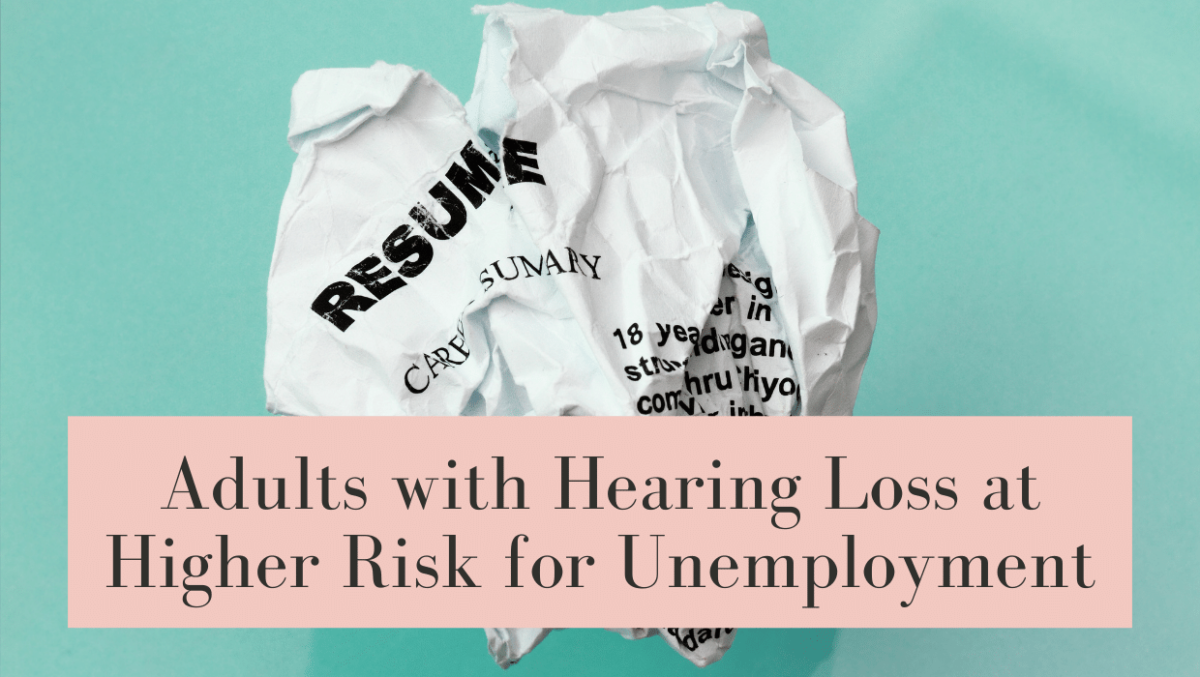Have you noticed changes in your hearing? When you first notice some hearing loss, you might not think it’s a big deal. After all, you’re still managing to hear most sounds, and you only ask people to repeat themselves one or two times.
However, struggling to hear, especially during conversations, is impacting you more than you might think. For example, a recent study found that adults with hearing loss are at a higher risk for unemployment.
Hearing Loss at Work
If you have a hearing loss, you’ve probably noticed that it’s harder to hear at work. Whether you work in an office, or out in the field, hearing loss can stop you from doing your best work. You’ll have a hard time hearing what’s being said, and you may miss important instructions or details. It becomes harder to connect with your coworkers, and you may find yourself completely exhausted from straining to hear.
Hearing loss at work can also be a safety hazard. If you’re on a jobsite but you can’t hear the sounds around you, you could get hurt. You may not hear the machinery coming towards you, or realize there’s a coworker approaching from the side.
Hearing Loss and Your Income
If your hearing loss is impacting your job performance, it’s only a matter of time before your income is affected. You might be making more mistakes at work, or interrupting meetings for clarification. Hear loss affects how you do your job, and how your boss perceives you.
A 2016 study by researchers at Johns Hopkins set out to discover if hearing loss has an impact on your earning potential and income. They asked over 3,000 adults to fill out surveys and take a hearing test. What they found is that people with hearing loss are 1.58 times more likely to have a lower income than people with normal hearing. People with untreated hearing loss are less likely to get a promotion, or have big career advancements.
Hearing Loss and Unemployment
The study from Johns Hopkins also looked at rates of unemployment. They discovered that people with hearing loss are 1.98 times more likely to be unemployed or underemployed! If you’re making costly mistakes at work, and your employer doesn’t know you have hearing loss, you’re more likely to lose your job. You may also have a harder time finding a job if you’ve had periods of unemployment, or you can’t hear clearly during the interview process.
Asking for Accommodations
Did you know that the Americans with Disabilities Act (ADA) protects people with hearing loss? This act prohibits employers from discriminating against anyone on the basis of their disability. You can’t lose your job based on your hearing loss, and your employer is required to provide reasonable accommodations to help you at work. Together, you can find a role that suits your abilities, and maintain your productivity at the company. These are some of the accommodations you can request:
- Ask for all instructions in writing
- Get meeting notes or an agenda ahead of the meeting
- Sit near the speaker during meetings
- Ask to be moved to a quieter workstation, away from any main hallways or break rooms
- Request closed captioning on any training videos
- Ask for a talk-to-text program for your work computer
Wear Your Hearing Aids
Now that you know how hearing loss can affect your earning potential and employment status, it’s time to treat your hearing loss! When you wear hearing aids at work, you’ll be able to hear during meetings, and easily hear all the sounds around you. This empowers you to do your best work, and get that promotion you have your eye on.
Modern hearing devices have a range of programs that help you hear no matter where you are. They’ll help you block out distracting sounds and focus on what you’re trying to hear. Speech enhancement programs will make it easier to hear and understand speech, so you won’t have to struggle to follow conversations.
Finally, you can even find connectivity features that let you stream audio from your phone or computer right to your ears. This will make client calls and meetings easy and you won’t need to stress about your hearing.
Have you experienced changes in your hearing? Taking a hearing test is an important part of your overall health and wellbeing! Contact us today to schedule an appointment.

